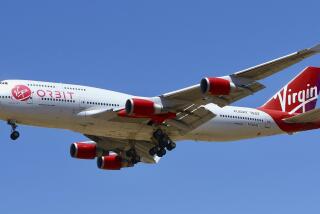McDonnell Douglas : Firm Lands Milestone Deal for 2 Rockets
McDonnell Douglas Corp.’s Huntington Beach unit said Wednesday it has landed a $100-million contract to build two Delta rockets for commercial satellite launches, a major milestone in the company’s efforts to capitalize on the commercialization of space.
The company’s contract with Hughes Aircraft Co. represents the industry’s first firm order for commercial launch vehicles, a potentially lucrative but highly competitive market that developed after the Challenger space shuttle disaster in January, 1986.
“We have made the first sale under the current U.S. policy of commercializing the access to space,” said Louis Raburn, senior director of Delta programs for McDonnell Douglas, which employs 6,200 people at its astronautics unit in Huntington Beach.
About 2,000 Huntington Beach employees are involved in the Delta program, which was revitalized last year after having been discontinued in 1984. Raburn said there would no additional hiring because of the Hughes contract.
McDonnell Douglas’ $100-million contract is part of a larger contract negotiated by Hughes to launch two communications satellites for British Satellite Broadcasting Ltd. The satellites will be used to beam commercial TV broadcasts to households across Europe.
Under the $300-million contract with the British consortium, Hughes will build the satellites and McDonnell Douglas will build the rockets. Both companies will subcontract with other firms for portions of the work.
The first satellite launch is scheduled for the third quarter of 1989 and will use a current-model Delta I rocket, which is capable of lifting payloads of up to 2,800 pounds. The second launch, scheduled for the third quarter of 1990, will use McDonnell Douglas’ upgraded Delta II rocket, which is capable of carrying 3,200-pound payloads.
The contract increases to 26 the number of Delta rockets covered by firm contracts. Earlier this year, McDonnell Douglas won a $669-million contract to build up to 20 Delta II rockets for the Air Force. The company has also contracted to build four Deltas for the National Aeronautics and Space Administration for about $150 million.
In addition to the two rockets ordered by Hughes, McDonnell Douglas said it is in final negotiations for two other contracts and has received non-binding reservations for six other commercial launches.
U.S. rocket manufacturing was revitalized by the Challenger disaster. In August, 1986, President Reagan barred most commercial satellites from future shuttle flights and encouraged development of a private space launch industry using unmanned rockets.
As a result of the Administration’s mandate, McDonnell Douglas and its two key competitors, General Dynamics and Martin Marietta, developed programs to land contracts to launch commercial payloads that were bumped from future Challenger flights.
Raburn said he believes McDonnell Douglas is positioned to win contracts for up to half of the projected 30 commercial launches expected during the next few years. At an estimated $50 million per launch, the commercial jobs could generate up to $750 million in revenues for the company.
Besides winning the first firm commercial launch contract, McDonnell Douglas said it set a precedent involving third-party liability for commercial space launches.
Under the terms of its contract with Hughes, McDonnell Douglas agreed to assume liability for any third-party claims that might arise if a launch failure results in damage to property owned by others.
The liability arrangement, the first of its kind, is considered significant because private insurers have been unwilling to provide such coverage.
“The liability issue has been one of the primary stumbling blocks in the commercialization of space,” Raburn said. “It was a very significant decision on the part of McDonnell Douglas to assume that risk.”
In addition, the company said its contract contains “re-flight” provisions that would obligate McDonnell Douglas to provide another launch vehicle if one of the two Deltas malfunctions.
In more than 47 launches covering nearly 10 years, Delta rockets have had a 98% success record, the company said.
McDonnell Douglas’ Delta contracts are being administered at the Huntington Beach unit, which handles engineering, design and fabrication of certain parts, sub-assemblies and electronic components. Final assembly of the Deltas is performed at a facility in Pueblo, Colo.
Raburn said McDonnell Douglas has been gearing up to produce about 12 Delta rockets per year, and the new contract will not alter the company’s current production and employment plans. Employment at the Huntington Beach plant jumped 20% last year and continues to increase, although Raburn declined to project a growth rate for the rest of 1987.
More to Read
Inside the business of entertainment
The Wide Shot brings you news, analysis and insights on everything from streaming wars to production — and what it all means for the future.
You may occasionally receive promotional content from the Los Angeles Times.










